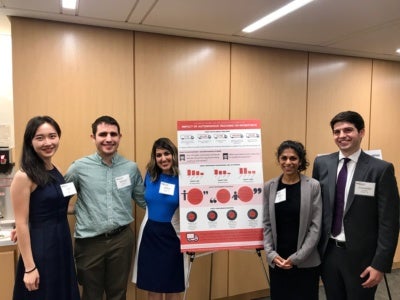A city perhaps best known for its historic steel production and past industrial prowess may not seem like an obvious innovation hub. But today, some of the most innovative technologies are being tested in the Steel City. Pittsburgh has become a real-world laboratory, exploring the technologies and industries changing what work will look like in the future. From teaching autonomous vehicles how to make a “Pittsburgh left” to using robots on its college campuses, the city has successfully leveraged the innovation coming out of its universities. And in doing so, Pittsburgh has been able to turn itself into a tech-mecca – re-directing the city from its Rust Belt past to its Tech Belt future.
Based in Pittsburgh and grounded in Carnegie Mellon University’s deep expertise in engineering, computer science, artificial intelligence and data analytics, CMU Heinz College of Information Systems and Public Policy is known for its work at the intersection of policy and technology. In recent years, the school has put growing emphasis on the future of work, including establishing a Future of Work initiative at The Block Center for Technology and Society. As CMU Heinz College Dean Ramayya Krishnan noted recently, “…the future of work is an important element of what it is we do at Heinz, because policy innovations and technology innovations must go hand in hand.”
The Aspen Institute Future of Work Initiative was fortunate to work with two graduate student teams from CMU Heinz College over the past six months to explore issues emblematic of the changing nature of work: access to benefits for freelancers and contract workers, and the potential impacts of autonomous trucks on the trucking workforce. In addition to providing a new perspective on these issues to the Initiative, the teams developed research and insights with the goal of helping inform policymakers as they develop solutions for workers navigating a changing economy.

Starting from an interest to learn more about the gig economy, one student team explored possible benefits models for gig workers. By drawing on the knowledge of policymakers, worker advocates, and private sector companies, the team developed a prototype portable benefit model that could be administered at the state level and would connect benefits like workers’ compensation and unemployment insurance to the worker, rather than to the job. Reflecting on her experience, team member Camille Moore shared, “This project has taught me a great deal about the future of benefits that many Americans are not able to afford on their own.” Find more about their recommendations here.

A second student team looked into a topic that has been the subject of a great deal of media attention – what the future could look like with self-driving trucks. This team focused on potential workforce impacts and policy responses to automation in the long-haul trucking industry. Specifically, the students administered a targeted three-round survey to transportation professionals and policy experts to better understand their views on how automation may impact trucking jobs and the overall size of the trucking workforce. Discussing their findings, team members Rashmi Singh and Michael Pessin noted, “Nearly all of our survey participants believed automation would bring greater efficiency and safety to the trucking industry. Participants’ feelings towards automation and the trucking workforce were much more varied. This disagreement is a reflection of the uncertainty on what a future trucking job looks like in an autonomous world.” Read more about their survey findings and insights here.
We’re grateful to the CMU Heinz College students and their faculty advisors for sharing their insights. On benefits and the gig economy, the team was comprised of Thomas Coughlin, Caroline Hall, Jennifer Knippenberg, Shirley Li, and Camille Moore, and was advised by Laurie Ellington. For autonomous trucking, the team included Juno Li, Athena Motavvef, Michael Pessin, Alex Romoff and Rashmi Singh with advisor Andy Richman.

